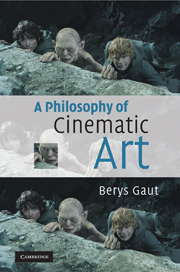4 - Understanding cinema
Published online by Cambridge University Press: 01 March 2010
Summary
Having discussed cinematic authorship, the question arises of how one is to understand films, the products of authorial actions. I begin by discussing the most influential theory of interpretation, intentionalism, and criticise it particularly in respect of its account of collaborative arts, such as cinema. In Section 4.2 I discuss one of the best and most influential theories of interpretation developed by a film theorist, David Bordwell, and show that his global constructivist account should be rejected, but argue that there is a limited role for construction in some films. In Section 4.3 I defend my own account of interpretation, the patchwork theory, in the context of cinema and illustrate it with a discussion of Rashomon (1950). Finally, in Section 4.4 I argue that intentions are likely to be subject to some different defeaters in digital as compared to traditional cinema, and show how interactivity makes possible a new kind of constructivism in cinema.
INTENTIONALISM
I will argue that intentionalism as a theory of interpretation of collaborative art forms, such as cinema, is false. I will also briefly argue that intentionalism fails as a theory of interpretation of art in general. But I will focus mainly on the collaborative case and show that collaborative art forms, compared to solo (non-collaborative) forms, present extra hazards that undermine the artist's intentions and provide extra grounds for unintended but meaningful features of works.
A collaborative artwork I will understand as one in which two or more artists interact to produce the work.
- Type
- Chapter
- Information
- A Philosophy of Cinematic Art , pp. 152 - 196Publisher: Cambridge University PressPrint publication year: 2010



